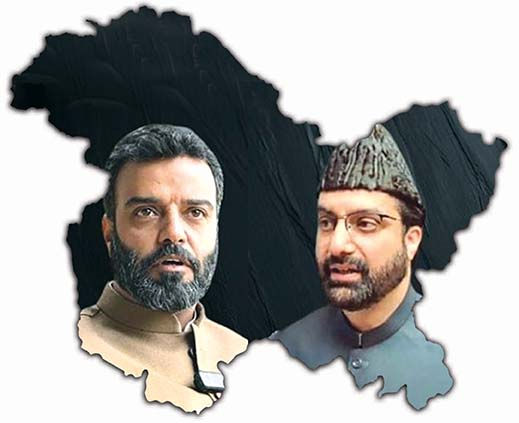Unlikely Convergence
- Correspondent
- Jan 30
- 3 min read
Updated: Jan 31
The meeting between Hurriyat’s Mirwaiz Umar Farooq and National Conference’s Aga Syed Ruhullah signals a shift in the political landscape of Jammu and Kashmir, but it raises more questions than answers.

In an unprecedented move, two influential political leaders from opposite ends of the ideological spectrum in Jammu and Kashmir (J&K) - Hurriyat Conference chairman Mirwaiz Umar Farooq and National Conference (NC) Member of Parliament Aga Syed Ruhullah – recently met in New Delhi to ostensibly discuss the pressing issues facing the people of J&K and Muslims across India.
The hour-long meeting is believed to signify the complex and evolving dynamics in J&K’s post-Article 370 era. The discussions centered on three key concerns: the abrogation of Article 370, the proposed Uniform Civil Code (UCC), and the Waqf (Amendment) Bill.
Historically, the Hurriyat Conference and the NC have been bitter rivals, representing divergent political ideologies. The Hurriyat Conference, born out of a coalition of separatist groups in the early 1990s, had long advocated for J&K’s independence from India or its merger with Pakistan, depending on the faction. On the other hand, the NC has traditionally supported the region’s autonomy within the Indian Union. To see these two leaders meet - one representing the mainstream political establishment, the other the face of separatism - is a striking reminder of the deepening political fissures within the state, but also an indication of shifting priorities.
Farooq, who heads the Muttahida Majlis-e-Ulema (MMU), an umbrella body of over 40 Muslim organizations in J&K, has been at the forefront of the region’s struggle for autonomy. In contrast, Ruhullah, a Shia cleric and an MP of the NC, has been more attuned to the intricacies of national politics, especially with the rise of concerns about Muslim rights across India. The meeting itself underscores the growing realization among political leaders in J&K that the region’s future cannot be understood in isolation from the broader issues facing Muslims in India, particularly in the aftermath of contentious legislative moves like the UCC and the Waqf Bill.
The Waqf (Amendment) Bill, which is currently under review by Parliament, has sparked significant controversy among Muslim leaders. The Bill proposes a central government-controlled Waqf board to manage properties belonging to the Muslim community, raising fears that it could infringe upon the community’s autonomy and rights. Mirwaiz Farooq, who had previously submitted a memorandum to the Joint Parliamentary Committee on the matter, has voiced strong opposition to the Bill, warning that it could turn Muslims into second-class citizens. His meeting with Ruhullah was a chance to align their positions and explore ways to build opposition across party lines, with plans to approach leaders like Chandrababu Naidu and Nitish Kumar – BJP’s coalition partners - for support.
For Farooq and Ruhullah, the UCC apparently represents an existential threat to the pluralistic fabric of India, particularly for Muslims. The two leaders have expressed concerns that the UCC could marginalize Muslim personal laws, further eroding the community’s rights and freedoms. This issue, much like the Waqf Bill, has led to growing tensions within the Muslim community, which is already feeling besieged by the government’s sweeping reforms.
While the meeting between these two leaders signifies a convergence of concerns, it is unclear whether this moment of unity will lead to a broader political shift in J&K. Farooq, who was once the face of J&K’s separatist movement, has sought to adjust his stance to address the changing realities post-2019. Yet his alliance with Ruhullah, who represents a party deeply entrenched in India’s political fabric, may face scepticism from his own supporters, many of whom view the NC as complicit in the dilution of J&K’s autonomy.
There is a significant political risk involved for the NC as its support for such an alliance could also alienate its base, which harbours reservations about such a cooperation with the Hurriyat. The political landscape in J&K is evolving, but whether this new-found alliance between Farooq and Ruhullah will result in meaningful political change remains uncertain.




Comments